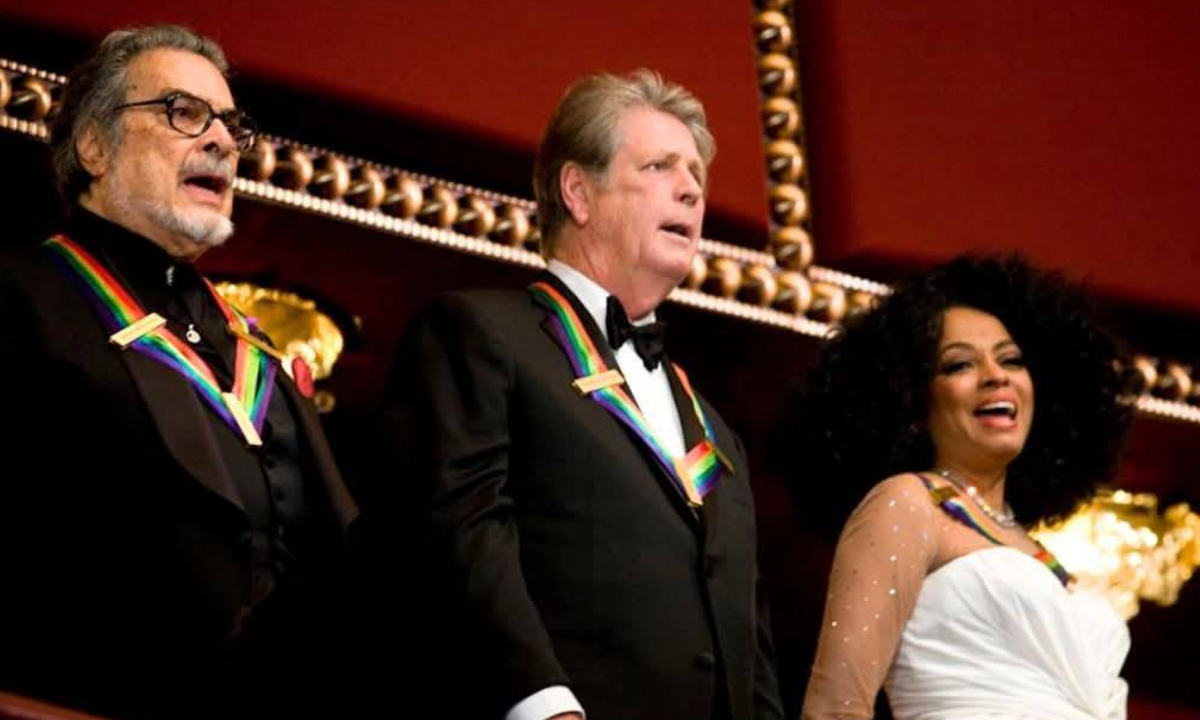
The Kennedy Center Pays Tribute to Brian Wilson in Emotional Posthumous Ceremony
When Music Became a Memorial: Honoring Brian Wilson
On June 12, 2025, the Kennedy Center in Washington, D.C. became more than just a venue—it became a place of collective remembrance. Rather than silence or solemn speeches, it was music that carried the weight of grief and gratitude for the life of Brian Wilson.
This wasn’t just an event—it was a farewell woven in melody, rhythm, and reverence. Audiences came not just to mourn, but to celebrate the gift he gave the world.
A NIGHT OF SOUND AND SOUL
Only one day after the legendary artist’s passing, the Kennedy Center was filled with musicians from across the musical spectrum. Classical ensembles, pop icons, and folk legends all came together—not to headline, but to honor.
Each performance felt like a personal message to Brian: intimate, emotional, and sincere. There were no grand speeches, no spotlight moments—just song after song, building a tribute that transcended words.
It was a night where harmony stood in for heartbreak—and where music, once again, did what Brian Wilson always knew it could: bring people together.

This evening wasn’t just about celebrating a legendary songwriter—it was about collective mourning. Through lyrics, instrumentation, and shared silence, the audience found a way to say goodbye.
Each performance held a quiet reverence. There were no showy solos or spotlight moments. Every voice, every note, carried the weight of remembrance—for a man whose music did more than entertain. It soothed. It connected. It healed.
BRIAN WILSON: A MUSICAL ARCHITECT AND VISIONARY
Born in 1942 in Inglewood, California, Brian Wilson rose from modest beginnings to change the course of popular music. While best known as a founding member of The Beach Boys, his true legacy lies in the sound he shaped and the emotion he embedded in every note.
From the haunting beauty of Pet Sounds to the mythical brilliance of Smile, Wilson composed more than just songs—he crafted sonic experiences. His voice was tender yet impactful, and his compositions layered complexity with vulnerability. Even as he faced deep struggles with mental health, his artistic light never faded.
His journey wasn’t one of perfection—it was one of perseverance. Of creating beauty in the midst of pain. Of turning personal battles into universal anthems.
MUSIC AS MEMORY: THE NIGHT OF TRIBUTES
At the Kennedy Center, the air was filled not just with sound, but with meaning.
Bruce Springsteen took the stage and delivered a stripped-down performance that felt like a final goodbye in the form of song.
Emerging artists brought new life to Wilson’s catalog, bridging generations and keeping his spirit alive for listeners who hadn’t yet discovered him.
Then came a moment that silenced the room—Sir Paul McCartney, with quiet admiration, simply said:
“God Only Knows… that’s the greatest song ever written.”
The room didn’t move. No one needed to. It was a moment suspended in reverence.
LOVE AND MERCY: THE CLOSING CHORD
As the final strains of Love and Mercy filled the hall, the audience remained still. No roaring applause, no loud farewells—just quiet reflection. Tears were shared, hands held, and hearts opened.
Because Brian Wilson didn’t just write music. He gave people permission to feel deeply—without shame, without fear.
HIS MUSIC, STILL WITH US
Though he may be gone, Brian Wilson’s music remains—on vinyl shelves, in playlists, in the memories we turn to when words fall short.
His harmonies live in the ocean’s rhythm, in soft echoes of Don’t Worry, Baby, in every time we dare to dream through sound.
His legacy isn’t fading. It’s playing on.
Every time we press play, Brian Wilson comes alive again.

